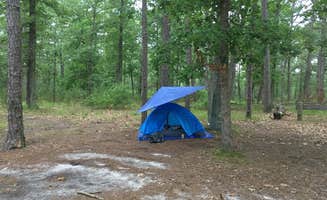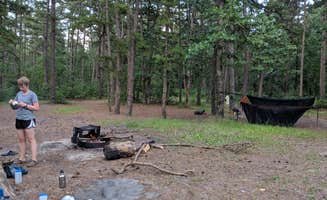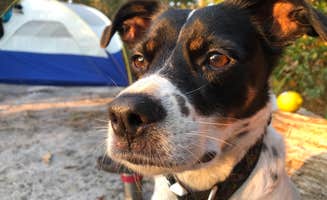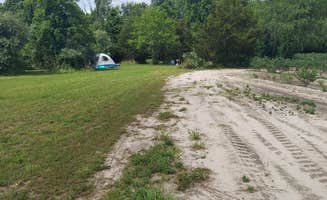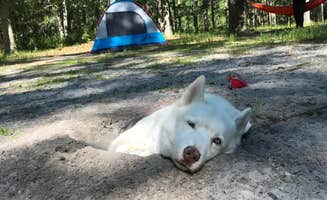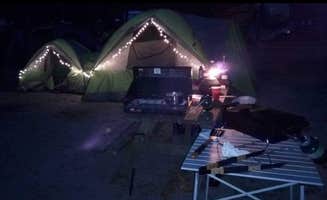Wharton State Forest offers tent campers a distinctive Pine Barrens ecosystem, characterized by acidic soil conditions that support unique plant communities. The forest spans over 122,000 acres of southern New Jersey, making it the largest single tract of land within the state park system. Sandy soil conditions throughout the camping areas provide naturally level surfaces, while the forest's elevation rarely exceeds 200 feet above sea level.
What to do
Paddling access points: The Wading River offers multiple put-in locations for canoes and kayaks. At Hawkins Bridge — Wharton State Forest, paddlers can launch directly from near Group Campsite A, though "the path down to it is steep and a little slippery, so use caution." Another visitor noted they "did a two day Canoe tour down the wading river and used the outfitter Micks Canoe," traveling 10 miles from Hawkins Bridge to Bodine Fields.
Lake activities: Swimming and fishing opportunities exist at several locations near tent camping areas. Bodine Field — Wharton State Forest provides access to "Harrisville Pond which mine as well be a lake. Good fishing for pickerel as well as a decent trail that goes around the entire pond." Atsion Lake, located a short distance from Goshen Pond, offers "a great place for kayaking and swimming" according to one visitor.
Batona Trail hiking: The 50-mile Batona Trail connects multiple camping areas and offers day-hiking options. The trail runs directly through Batona — Wharton State Forest where "trailheads begin directly from campsites. Trails vary in length but all are flat and easily accessible." Another camper mentioned they "hiked from the Batso Office to the Mullica River tent sites. Trail could get a tad sandy but it's well maintained."
What campers like
Privacy levels: Many campers appreciate the varying degrees of seclusion available at different camping areas. At Goshen Pond — Wharton State Forest, campers like that "you park off and walk in to your site. There is more foot traffic, but you don't hear as many cars coming and going and driving past your site all the time." Another visitor mentioned "our site was private and secluded. We had a great time."
River proximity: Direct access to water from many campsites is a commonly mentioned benefit. At Bodine Field, campers enjoy being "right next to the wading river/creek with that amazing cedar water." A visitor to Goshen Pond noted "our site was right next to the Mullica River, and had excellent views if you walked just a couple steps from the tent. We were able to put our kayaks in right next to the site which was very convenient."
Group camping options: Several campgrounds offer designated group sites for larger parties. Abbot Sawmill is "close to the main roads but feels remote" and is described as "great for groups." Bodine Field has "a handful of trees in the middle, group sites available" making it suitable for organized outings.
What you should know
Seasonal conditions: Many campgrounds operate on a limited seasonal schedule. Most Wharton State Forest campgrounds operate from April 1 through October 31. At Bodine Field, campers note that "during the off season is in and during the week, it's very peaceful and awesome place to be. During the weekend it's very populated and tends to be pretty noisy."
Wildlife concerns: Campers should be prepared for encounters with local wildlife. Lower Forge Camp and other backcountry sites require awareness of potential bear activity. One camper advises to "be bear aware" while camping in the area. Ticks are also prevalent, with one visitor warning "watch for chiggers and ticks" and another noting "there are LOADS of ticks in this area."
Access limitations: Some campgrounds require significant effort to reach. Lower Forge requires backpacking "with access from either (Atsion 5+ miles in) or Batsto (7 miles)," though some visitors report unauthorized vehicle access: "though we were told it was hike-in only, there were clearly many people who drove in." Access roads can also be challenging, with Batona Campground featuring "about 1 mile of loose sand. It can be accessed by a standard vehicle."
Tips for camping with families
Restroom facilities: Bathroom options vary widely between campgrounds. At Bodine Field, "composting outhouse toilets are not great" but are available throughout the campgrounds. Some sites like Batona have "two pit toilets that was pretty bad shape but we are used to disperse camping without toilets so we didn't complain."
Weekday visits: For families seeking quieter experiences, timing is crucial. At Bodine Field, it's "very peaceful and awesome place to be" on weekdays but "during the weekend it's very populated and tends to be pretty noisy." Another visitor noted that Hawkins Bridge "is very quiet and doesn't see a lot of traffic" making it suitable for families seeking tranquility.
Camping surfaces: Parents appreciate the comfortable natural ground conditions. Hawkins Bridge offers "soft, even ground for sleeping" and throughout the Pine Barrens "the ground is soft and comfortable to sleep on (NOT rocky at all, like almost weird how few rocks there are)." This makes tent setup easier for families with young children.
Tips from RVers
Vehicle size limitations: The narrow access roads limit RV camping options. At Batona Campground, "sites are suitable for tents or small campers. The unpaved road into the site is narrow and tree lined. A larger RV would not fit." Most Wharton State Forest campgrounds cannot accommodate large RVs due to tight turns and sandy conditions.
Campsite setups: Basic amenities vary between locations. Hawkins Bridge has "no picnic table at the campsite. Bring a folding table or a cooler for a cooking surface." Batona Campground provides "a fire pit with a grate (no picnic tables)" at each site.
Services and hookups: Limited hookup options exist within the forest. For full hookup options, RVers recommend Red Wing Lakes which offers "electric, water and sewer hookups" plus additional amenities like "bath houses" and organized activities.



